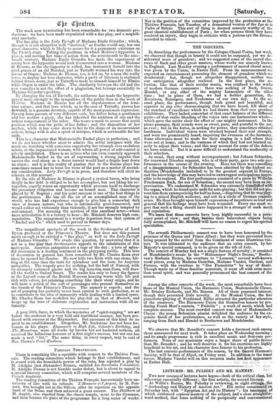THE CONCERTS.
In describing the performance by the Cologne Choral Union, last week, we observed that though in beauty it could not be surpassed, yet we de- siderated more of grandeur; and we suggested some of the sacred cho- ruses of Bach and other great masters, whose works are scarcely known in England. Last Monday evening a performance of sacred choral music was given by the Union, in Exeter Hall. From its announcement we expected an entertainment possessing the element of grandeur which we desiderated ; but, though not altogether disappointed, neither was our anticipation altogether realized. In the first place' the se- lection, like that of their secular music, was confined to the works of modern German composers : there was nothing of Bach, Graun, Handel, or any other of the mighty harmoniats of the olden time ; but in place of them, we had a feebler generation, the Kreutzers, Reissigers, and Neukomms of our own day. In the se- cond place, the performance, though both grand and beautiful, and superior to any other chorus-singing that we have heard, fell short of the standard of excellence which we bad drawn from their own previous exhibitions. They lacked somewhat of that exact balance of the different parts—of that entire blending of the voices into one harmonious whole— which gave the entire choir the effect of one mighty instrument. In the piano passages, their sounds were as sweet, pure, and grateful to the ear, as ever ; but in the fortes, in seeking for power, they sometimes obtained harshness. Individual voices were strained beyond their real strength, and were too prominently heard, impairing the evenness of the harmony. Some allowance must be made for their singing in a hall where they were not at home, and to the vastness of which they had not learned ex- actly to adjust their voices ; and this may account for some of the defects we have noticed. But it is more difficult to understand the mediocrity of their selection.
As usual, they sang without accompaniment ; but Johann Schneider, the renowned Dresden organist, who is of their party, gave two solo per- formances in the course of the evening. Here too there was something of a disappointment ; for Schneider has been admitted by the highest -au- thorities (Mendelssohn included) to be the greatest organist in Europe, and the knowledge of this may have led to extravagant anticipations impos- sible to be realized. His first performance consisted of a piece by Wilhelm Friedemann Bach, the son of Sebastian ; the second may have been an im- provisation. We understand M. Schneider was extremely diesatisfied ' th
ica. the organ, which he found quite unfit for solo-playing ; but this did not vent him from extemporizing for half an hour,—forgetting that he
ing to a mixed English audience, and not to a circle of German conzunt= seurs. He thus brought upon himself expressions of impatience so loud and general that his feelings must have been wounded. Every one must re- gret that such a thing should have happened to a stranger of such merit and reputation. We learn that these concerts have been highly successful in a peal-, niary point of view - and that, besides their benevolent objects befig fully accomplished, idr. Mitchell will have no reason to regret his spirited speculation. ,...
The seventh Philharmonic concert was to have been honoured by the presence of the Queen and Prince Albert ; but they were prevented from being present by the arrival from the Continent of some illustrious visi- tors. It was intimated to the audience that an extra concert, by her Majesty's special command, is to be given on the 4th of July. The concert of Monday had not a single feature of novelty; it consisted of Mendelssohn's music in the "Midsummer Night's Dream," Beetho- ven's Sinfonia Eroica, his overture to "Leonora," several well-known vocal pieces sung by Madame Castellan, Madame Viardot, Gardoni and Formes, with the overture to "Der Freischiitz " by way of &ale. Though made up of these familiar materials, it went off with even more than usual spirit, and was generally pronounced the beat concert of the season.
Among the other concerts of the week, the most remarkable have been those of the Musical Union, the Harmonic Union, Mademoiselle Clause, Mr. Brinley Richards, and Mr. Benson. All of these possessed interest, though they presented little novelty. At the Musical Union, the fine pianoforte-playing of Ferdinand Hiller attracted the particular attention of the amateurs. The Harmonic Union did themselves honour by pro- ducing Frank Mori's cantata, " Fridolin" ; a work of merit, which had complete success. The most crowded concert was that of Mademoiselle Clauss : the young Bohemian pianist delighted the audience by the ex- quisite finish of her performance, as well as the variety of her style, ranging from Bach and Handel to Beethoven and Mendelssohn.
We observe that Mr. Benedict's concert holds a foremost rank among those announced for next week. It takes place on Wednesday morning ;. and its ample programme is rich in excellent music and first-rate per- formers. None of our musicians enjoy a larger share of public favour than Mr. Benedict • and he well deserves it, for his exertions are highly beneficial to his art, and his character does honour to his profession. The last oratorio performance of the season, by the: Sacred Harmonic Society, will be that of Elijah, on Friday next. In addition to the usual forces, Madame Viardot will on this occasion make. hetlyst appearance at Exeter Hall. 3,i3 nu e


























 Previous page
Previous page